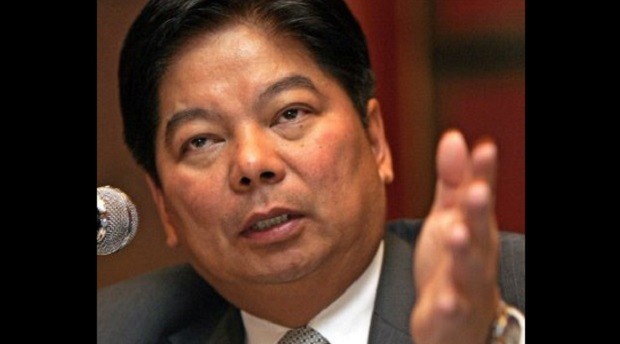AMLC calls for easing of PH bank secrecy law
The Philippines’ “very strict” bank secrecy law is hampering the country’s fight against money laundering, Bangko Sentral ng Pilipinas Governor Amando Tetangco Jr. said on Friday.
Tetangco, who also chairs the Anti-Monetary Laundering Council (AMLC), reiterated his call to allow prying into a wider array of bank deposits “under certain conditions.”
READ: AMLC chair eyes easing of bank secrecy law
“When a case reaches the AMLC, that is when an investigation begins. So the incident has already happened. We need some kind of preventive measures. The prevention of this particular activity is being hampered by the very strict bank secrecy law,” Tetangco told reporters on the sidelines of the Chamber of Thrift Banks’ national convention.
In this regard, Tetangco said he was amenable to easing or lifting the bank secrecy law under certain conditions, but he did not elaborate.
The investigators are looking into the laundering through the Philippine financial system of $81 million stolen by Chinese computer hackers from the account of Bangladesh Bank, the Bangladeshi central bank, in the Federal Reserve Bank of New York last month.
The money was transferred to five fictitious accounts at the branch of Rizal Commercial Banking Corp. (RCBC) on Jupiter Street in Makati City then moved to other banks and to the bank accounts of three local casinos before being taken out of the country.
Weak point
The AMLC, National Bureau of Investigation and the Senate are investigating the caper, which has put international focus on the Philippines as a weak point in the global financial system.
Senate investigators have run into pleas of bank secrecy from bank employees in their efforts to trace the money trail from the New York Fed to the RCBC Jupiter branch in early February and from there to the country’s loosely regulated casinos.
Casinos in the Philippines are exempt from antimoney-laundering requirements.
The Philippines also retains what one US official once called some of the world’s toughest bank secrecy laws, recalling a time before the rise of concerns about terrorism financing and tax evasion, when countries promised privacy in the hopes of becoming financial hubs.
But experts and US officials say the Philippines remains a difficult place to catch money launderers.
In a report a year ago on financial crimes, the US state department cited the Philippines’ tight bank secrecy laws, a lack of regulation around casinos and difficulties faced by local regulators in watching transactions involving real estate, jewels and nonprofit groups.
It said that in the first 10 months of 2014, the Philippines had one conviction and no prosecutions begun on money-laundering charges.
“The small number of prosecutions and convictions is telling,” the report said.
Amendments to the laws
Sen. Serge Osmeña III, chair of the committee on banks, financial institutions and currencies, on Thursday said he was preparing to propose amendments to the antimoney-laundering law.
Osmeña said he wanted gaming, and possibly real estate brokers and art dealers, to be subject to the antimoney-laundering law.
He said he also wanted bank secrecy laws to be relaxed.
Earlier, Osmeña said the culprits chose the Philippines to launder the Bangladesh money “because our system is full of loopholes.”
“We have been trying to amend these laws for decades, but we can’t get it through Congress,” he said.
“The trend now in the world is having bank disclosures, not bank secrecy,” Sen. Grace Poe, a presidential candidate in May’s national elections, said earlier this week. “This is to prevent also the funneling of money to terroristic activities, drug cartels, etc. We should be one with the international community in preventing such activities.”
Appropriate action
Tetangco said on Friday that “if the findings [of the investigations] show that further action has to be taken, then the AMLC is prepared to do that.”
While declining to comment on the mess at RCBC due to the confidentiality requirements, Tetangco noted that “in principle, if there is liability discovered in the course of the investigation, then the appropriate action should be taken.”
“This principle applies to all covered institutions. It does not have to be a specific bank or specific remittance company. We will apply the same thing if there is a similar situation,” he added.
Tetangco played down the impact of the money-laundering scandal on the banking system as a whole.
“If you look at the behavior of the financial markets for the last several days, there has been no indication that there is a negative impact. In fact, the peso has been appreciating in the last few days. The bond markets are steady, the [Philippine Stock Exchange] has been steady and sometimes going up,” he said.
But “we have to recognize that there is a risk associated with this,” he said.
“We need to address that [risk]. We have to show that there is action being taken with respect to any particular case and with respect to further strengthening the legal framework,” Tetangco said.
That, he said, is the reason why the AMLC has been working with Congress to expand the coverage of the Anti-Money Laundering Act to include casinos and real estate.
Prevention aspect
“This is an opportune time to take a look at this and really make a decision consistent with our desire to strengthen the antimoney-laundering framework in the country so we don’t become a center for money laundering. We will be working with the government and Congress. We have to make sure the prevention aspect would be there,” Tetangco said. With reports from AP
RELATED STORIES
Biz Buzz: Banks versus casinos
